Filter by
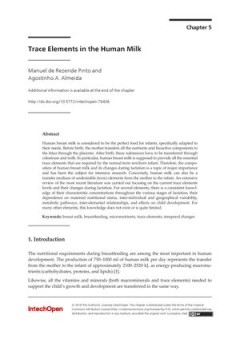
Trace Elements in the Human Milk
Human breast milk is considered to be the perfect food for infants, specifically adapted to their needs. Before birth, the mother transfers all the nutrients and bioactive components to the fetus through the placenta. After birth, these substances have to be transferred through colostrum and milk. In particular, human breast milk is supposed to provide all the essential trace elements that are …
- Edition
- -
- ISBN/ISSN
- 9781789236705
- Collation
- -
- Series Title
- -
- Call Number
- -
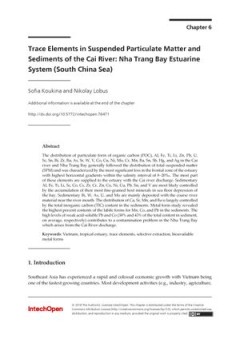
Trace Elements in Suspended Particulate Matter and Sediments of The Cai River…
The distribution of particulate form of organic carbon (POC), Al, Fe, Ti, Li, Zn, Pb, U, Sc, Sn, Bi, Zr, Ba, As, Sr, W, V, Co, Cu, Ni, Mo, Cr, Mn, Ba, Sn, Sb, Hg, and Ag in the Cai river and Nha Trang Bay generally followed the distribution of total suspended matter (SPM) and was characterized by the most significant loss in the frontal zone of the estuary with highest horizontal gradients with…
- Edition
- -
- ISBN/ISSN
- 9781789236705
- Collation
- -
- Series Title
- -
- Call Number
- -
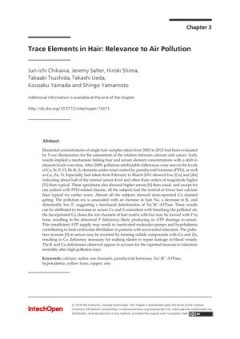
Trace Elements in Hair Relevance To Air Pollution
Elemental concentrations of single hair samples taken from 2003 to 2012 had been evaluated by X-ray fluorescence for the assessment of the relation between calcium and cancer. Early results implied a mechanism linking hair and serum element concentrations with a shift in element levels over time. After 2009, pollution-attributable differences were seen in the levels of Ca, Sr, P, Cl, Br, K, S, …
- Edition
- -
- ISBN/ISSN
- 9781789236705
- Collation
- -
- Series Title
- -
- Call Number
- -
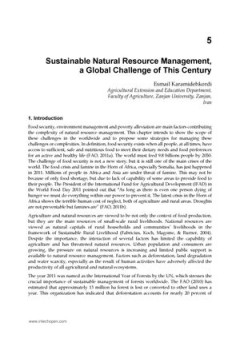
Sustainable Natural Resource Management, a Global Challenge of This Century
Sustainable Natural Resource Management, a Global Challenge of This Century
- Edition
- -
- ISBN/ISSN
- 9789533076706
- Collation
- -
- Series Title
- -
- Call Number
- -
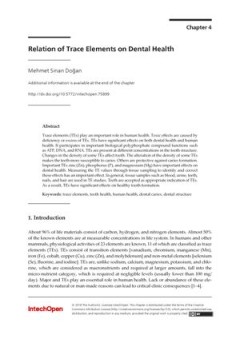
Relation of Trace Elements on Dental Health
Trace elements (TEs) play an important role in human health. Toxic effects are caused by deficiency or excess of TEs. TEs have significant effects on both dental health and human health. It participates in important biological polyphosphate compound functions such as ATP, DNA, and RNA. TEs are present at different concentrations in the tooth structure. Changes in the density of some TEs affect …
- Edition
- -
- ISBN/ISSN
- 9781789236705
- Collation
- -
- Series Title
- -
- Call Number
- -
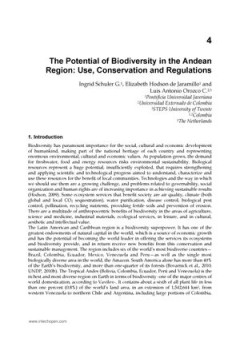
The Potential of Biodiversity in The andean Region Use, Conservation and Reg…
The Potential of Biodiversity in the Andean Region: Use, Conservation and Regulations
- Edition
- -
- ISBN/ISSN
- 9789533077062
- Collation
- -
- Series Title
- -
- Call Number
- -
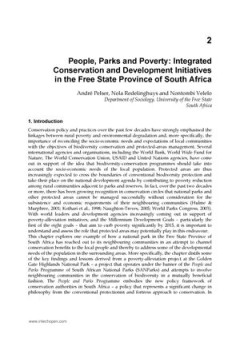
People, Parks and Poverty integrated Conservation and Development initiative…
People, Parks and Poverty: Integrated Conservation and Development Initiatives in the Free State Province of South Africa
- Edition
- -
- ISBN/ISSN
- 9789533077062
- Collation
- -
- Series Title
- -
- Call Number
- -

Minor and Trace Elements in Whole Blood, Tissues, Proteins and Immunoglobulin…
Microelements play different important roles in many physiological processes in all biological systems in both normal physiological and pathological conditions. They take part in the transport of nutrients and gases, support temperature, acid-base balance, homeostasis of the human organisms, maternal and child mental health, the functioning of enzymes, protein and DNA syntheses, cytoskeleton ac…
- Edition
- -
- ISBN/ISSN
- 9781789236705
- Collation
- -
- Series Title
- -
- Call Number
- -
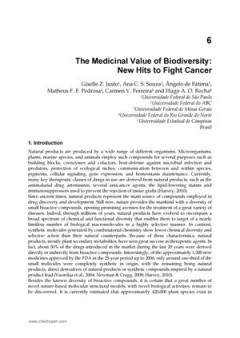
The Medicinal Value of Biodiversity New Hits To Fight Cancer
The Medicinal Value of Biodiversity: New Hits to Fight Cancer
- Edition
- -
- ISBN/ISSN
- 9789533077062
- Collation
- -
- Series Title
- -
- Call Number
- -
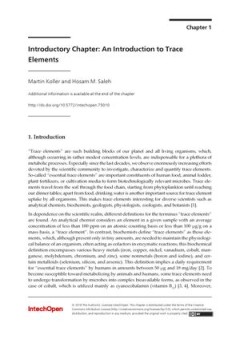
Introductory Chapter: An introduction To Trace Elements
Introductory Chapter: An Introduction to Trace Elements
- Edition
- -
- ISBN/ISSN
- 9781789236705
- Collation
- -
- Series Title
- -
- Call Number
- -
 Computer Science, Information & General Works
Computer Science, Information & General Works  Philosophy & Psychology
Philosophy & Psychology  Religion
Religion  Social Sciences
Social Sciences  Language
Language  Pure Science
Pure Science  Applied Sciences
Applied Sciences  Art & Recreation
Art & Recreation  Literature
Literature  History & Geography
History & Geography